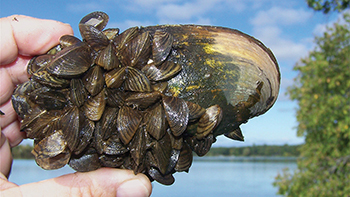
| Aug. 2017 | |||||||||||
| Top stories | |||||||||||
| In the news | |||||||||||
| Photos | |||||||||||
| Contact us | |||||||||||
| Archive | |||||||||||
|
Lab helps limit spread of invasive species |
Sept. 5, 2017 --
The Iowa Department of Natural Resources reported on Aug. 15 that it is monitoring Carter Lake for zebra mussels, an invasive species that can be destructive to ecosytems, aquatic food chains, boats and other manmade structures. There is no effective treatment to control zebra mussels once they have infested a lake.
 Zebra mussels attach to a shell Photo courtesy of Minnesota DNR
Zebra mussels attach to a shell Photo courtesy of Minnesota DNRZebra mussels are native to the Caspian Sea region of Asia, and were brought by maritime ships to the Great Lakes in the 1980s. They since have spread to the Missouri and Mississippi rivers, and lakes in many states, including Iowa and its Clear Lake in the Okoboji area.
Juvenile zebra mussels were found in Carter Lake, a border lake connecting Omaha and Carter Lake, Iowa. Only adult zebra mussels attach and quickly spread to cover their prey or structures.
“Finding zebra mussel veligers [larva] indicates to us that zebra mussels have been introduced into Carter Lake,” said Kim Bogenschutz, the Iowa DNR’s Aquatic Invasive Species Program Coordinator. “But, it’s too early to tell if there is an established population in the lake.”
The Carter Lake detection is the latest in a series that began in the state more than 25 years ago. Zebra mussels were first documented in Iowa in 1992 from the Mississippi River near Burlington. One year later, they were reported throughout the entire length of the Mississippi River bordering Iowa. The first zebra mussels reported in interior waters were from Clear Lake in 2005 and Lake Delhi in 2006.
During the past few years, the State Hygienic Laboratory has measured the effects of the mussels and worked with two cities that draw their drinking water from West Lake Okoboji, which borders Lakeside Lab. These cities treat their water with copper ion to prevent zebra mussels from collecting on intake lines, and routinely test the water for levels of copper. Dennis Heimdal, SHL environmental lab specialist located at Lakeside Lab, sends the samples via the courier to Ankeny for verification of their results.
“Lakeside and SHL are using water quality data to determine what zebra mussels are doing to the lake’s water quality,” Heimdal said. “There is pre- and post-zebra mussel water quality data we can look at to see – over the long term – what the zebra mussels are possibly doing. It's hard to pinpoint anything yet.
“Lakeside is also host to students over the summer who work at boat ramps to educate the public about invasive species. They also inspect boats going into the lakes for invasive species.”
It is illegal in Iowa to possess or transport prohibited aquatic invasive species, such as zebra mussels, the Iowa DNR reports. Boaters are required to drain all water from boats and equipment before leaving a water access, and keep drain plugs removed or opened during transport.
“Boaters and anglers can unintentionally spread zebra mussels and other aquatic invasive species if they do not take the proper precautions - clean, drain, dry - after each time out on the water,” said Bogenschutz.
Iowa DNR asks that boaters take the following precautions:
- Clean any plants, animals or mud from boat and equipment before you leave a water body.
- Drain water from all equipment (motor, live well, bilge, transom well, bait bucket) before you leave a water body.
- Dry anything that comes into contact with water (boats, trailers, equipment, boots, clothing, dogs). Before you move to another waterbody either:
- Spray your boat and trailer with hot, high-pressure water; or
- Dry your boat and equipment for at least 5 days.
- Never release plants, fish or animals into a water body unless they came out of that water body and empty unwanted bait in the trash.
Find more information about aquatic invasive species and a list of infested waters on the Iowa DNR web page, Fighting Invasive Species.
Iowa DNR asks that anyone who sees a zebra mussel note its location and contact the local fisheries office or the Aquatic Invasive Species Program in Boone at 515-432-2823.